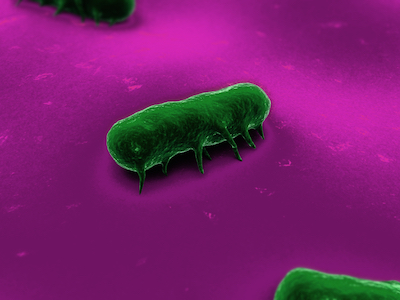 After sickening 192 people in five states, a Salmonella outbreak linked to pork from Kapowsin Meats of Graham, Wash. has ended. The antibiotic resistant outbreak strains of Salmonella I 4,[5],12:i:- and Salmonella Infantis hospitalized 30 people, according to the Centers for Disease Control and Prevention (CDC).
After sickening 192 people in five states, a Salmonella outbreak linked to pork from Kapowsin Meats of Graham, Wash. has ended. The antibiotic resistant outbreak strains of Salmonella I 4,[5],12:i:- and Salmonella Infantis hospitalized 30 people, according to the Centers for Disease Control and Prevention (CDC).
Most of the illnesses occurred in Washington. By state, the case count was as follows: Alaska (1), California (2), Idaho (2), Oregon (3) and Washington (184).
Most of those who became ill reported attending events where whole pigs were roasted before they became symptomatic. Salmonella causes symptoms including nausea, vomiting, abdominal cramps, diarrhea, bloody diarrhea and fever which usually develop within six to 72 hours of exposure and last up to a week. Those sickened in this outbreak reported onset of illness dates from April 25, 2015 to October 10, 2015.
Kapowsin issued a recall on August 13 and the expanded the recall and ceased production on August 27, 2015. In all, 523,380 pounds of pork products were recalled.
The CDC’s National Antimicrobial Resistance Monitoring System (NARMS) laboratory conducted the antibiotic-resistance testing on samples from 10 case patients. Results of the tests showed all of the isolates tested were multidrug resistant. Antibiotics including ampicillin, streptomycin, sulfisoxazole, and tetracycline were not effective in combatting the infections. Antibiotic resistance is associated with illnesses that are more severe, increased risk of hospitalization, longer hospital stays and increased risk of complications.
A small number of Salmonella infections migrate from the gastrointestinal tract to the bloodstream, causing an infection called sepsis. These cases need immediate medical treatment as they can be fatal. Long-term complications of a Salmonella infections can include heart problems, irritable bowel syndrome, and reactive arthritis, which causes painful swelling of the joints and eye irritation.
The symptoms of a Salmonella infection include nausea, vomiting, diarrhea that may be bloody, and abdominal cramps. Those symptoms usually appear within a few days to a week after exposure to the pathogenic bacteria. While most people recover on their own, some become so ill they must be hospitalized. And the long term complications of this infection can be serious, including Reiter’s Syndrome, which can cause reactive arthritis and high blood pressure. This infection should be on your record in case problems develop in the future.




